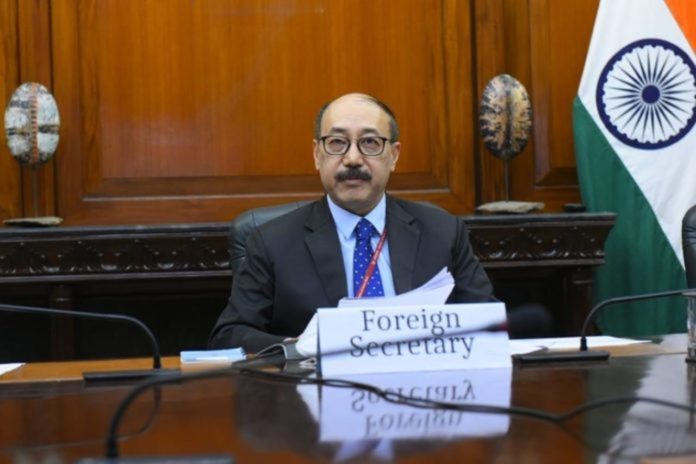Dhaka/New Delhi (NVI): Indian Foreign Secretary Harsh Vardhan Shringla arrived here on an unannounced visit and met Prime Minister Sheikh Hasina, against the backdrop of indications that Dhaka is cozying up to China.
External Affairs Ministry said in a statement in Delhi that Shringla was on a two-day visit, beginning today, to “discuss and take forward cooperation on matters of mutual interest.”
Shringla, who has served as India’s High Commissioner in Dhaka earlier, arrived in the Bangladesh capital by a special plane at around 11.30 and soon after met Hasina, according to local media reports. He was believed to be carrying a special message from Prime Minister Narendra Modi for Hasina.
Shringla had last visited Dhaka in early March and this is the first visit by a high-level Indian official since the Covid-19 pandemic exploded in the same month.
Significantly, the visit takes place against the backdrop of an announcement that China would be granting a loan of one billion dollars to Bangladesh for the ‘Comprehensive Management and Restoration Project’ of Teesta River.
The Chinese funding for the Teesta project is worrying for India as a proposal for signing a pact between India and Bangladesh regarding sharing of this river’s water has been pending for long.
According to local media reports, Bangladesh is going for the deal with China on the Teesta project because Indian government failed to finalise the treaty.
The river originates in Sikkim, passes through West Bengal and merges with Brahmaputra in Assam and Jamuna in Bangladesh. Around 113 kilometres of the 315-kilometre river lies in Bangladesh.
The India-Bangladesh Teesta water-sharing pact was almost done in 2011 but it got stuck at the eleventh hour as West Bengal Chief Minister Mamata Banerjee refused to agree to it.
Prime Minister Modi, on his first visit to Dhaka in 2015, had promised that India will expedite finalisation of the treaty but there has been no headway still, mainly due to opposition by Banerjee.
The development related to Chinese funding of the project is worrying for India as it shows China is gaining footprint in Bangladesh, as part of Beijing’s aggressive effort to gain influence and foothold in all the neighbouring countries of India.
As years of negotiations with India over the Teesta river’s management led to no visible output, Bangladesh’s Ministry of Water Resources thought of getting it done by China, that too with a loan from the latter, according to Daily Star newspaper of Bangladesh.
In a letter to the Economic Relations Division (ERD) last month, the ministry sought a $983.27 million loan from China to implement a “Teesta River Comprehensive Management and Restoration Project”, it said.
The project summary states that floods lead to serious erosion for a lack of necessary protective measures, leaving huge amounts of property and home estates submerged every year.
The majority of an existing embankment has been eroded for a lack of proper maintenance while a water crisis arises in the dry winter months.
The letter, signed by Khairun Nahar, the ministry’s senior assistant chief, and sent on 23 July, also talked about plans to construct and commission a photovoltaic power plant under the project.
The development plans have been held back for a decade for a lack of funds.
Several Chinese companies were interested in implementing this project but the Chinese government was yet to give a green signal, Md Shahriar Kader Siddiky, joint secretary (Asia wing) to the ERD, was quoted by the newspaper as saying.
The ministry needs to fill up a Chinese application form seeking the loan, he said.
“We will send the documents to the Chinese embassy for including the project under applications seeking Chinese funds,” Siddiky added.
There are three to four hydro-electricity projects on Teesta in Sikkim and two irrigation projects in West Bengal, the newspaper quoted Syed Muazzem Ali, a former High Commissioner of Bangladesh to India.
A dam constructed on the Indian side causes the water flow to reduce downstream in winter, leading to a water crisis for two months on the Bangladesh side, it quoted Md Kabir Bin Anwar, senior secretary to the ministry.
“If we can implement the project, a vast area on the Bangladesh side can be supplied with water during the crisis season,” Anwar said.
The project not only aims at river regime and flood control but also to meet a water crisis in the dry season and enable economic development in the greater Rangpur region, the newspaper report said.
Its other aspects are land reclamation, development and utilisation, transportation and shipping, mitigation of social and environmental impact and restoration of ecosystem and promoting socio-economic development of locals, it said.








